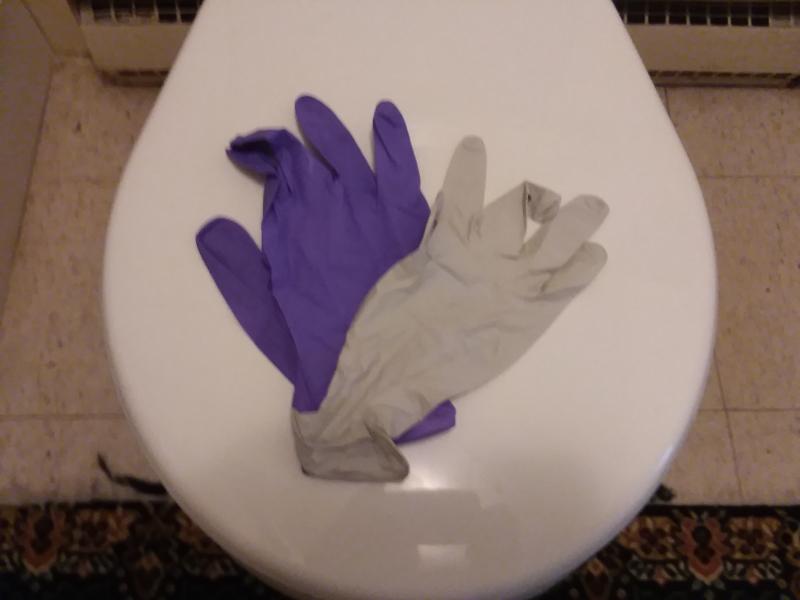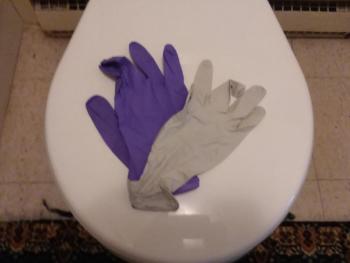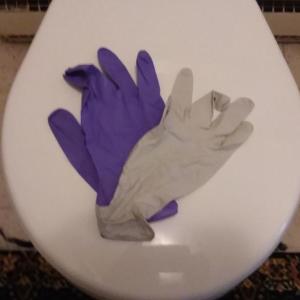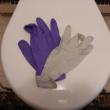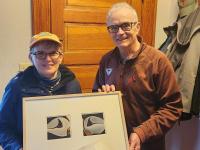Improper PPE disposal puts Rockland sewer employees at risk
ROCKLAND — In recent weeks, a hospital mask, exam gloves and disposable wipes have been extricated from within the sewer pipes of Rockland Pollution Control (aka Wastewater Treatment Facility).
The effects of those blockages are not only costly disruptions to the sewer system, but they heighten the risk to the employees’ personal safety during the COVID-19 pandemic.
Studies have shown that the COVID-19 virus can be detected in the diarrhea of people known to have the virus, according to Facility Director Terry Pinto.
Where does that all go? To the Wastewater Treatment Plant.
“At some point, if there’s a [system] failure, it means that the employees working there have to come in some kind of contact with it,” said Pinto.
That contact usually initiates with the removal of items within the pipes that shouldn’t be there in the first place.
For these situations, they dress in their normal protective gear of hazmat suits, masks, and gloves, since they are already confronted with the risk of contaminants on a daily basis. However, since COVID is new, no one knows whether it carries through the sewer system or not.
The entire treatment system is based on motors and pumps. Once in the pipe, rubber gloves can cause any of the hundreds of motors in Rockland to burn out, which can be extremely expensive, labor intensive, and dangerous, said Pinto.
Gloves can also jam the mechanical pumps, which move wastewater through the various stages of the treatment process. Rockland has 10 neighborhood pump stations. If one of those pumps gets jammed, reversed flow could be forced back into the neighborhood.
A new pump costs $75,000, and though Rockland has spares, which allow for almost continuous operation while the damaged item is sent away for repairs, a Rockland employee must manually pull the problem pieces from the scene.
It’s a national dilemma, according to Pinto. Flushing of disposable wipes has always been a problem, yet the situation has increased noticeably along with the spread of the recent disease.
Because residents deem their used personal protective equipment as dirty, they become fearful of those products, creating a desire to be rid of them safely. Flushing is most common, yet some towns are now seeing gloves abandoned in retail store parking lots, according to Pinto.
“Anything that’s dirty,” he said, “[people] think an easy way to get rid of it is – flush it down the toilet.”
A better option, he said, is to place the items in a plastic bag, tie the bag, and dispose of it with the regular garbage.
What the public tends not to realize is that what they no longer see still must be dealt with by someone else. If not picked up by someone, the gloves and masks flow into streams, or into the storm drain, which flows into the sewer pipes.
Rockland has seven treatment facility employees. This is not due to COVID-19 related shutdowns, but because the applicants applying for open positions don’t have the qualifications demanded by the State. As a result, two shifts per day are scheduled, covering 24 hours per day, seven days per week. Because of the coronavirus, the two employees at a time, working in staggered shifts, try to keep their distance from each other. Yet, most equipment failures usually require three sets of hands.
Other City departments can close if they experience equipment shortages or reduced personnel, according to Pinto. If the landfill closes for a day, residents can wait until the next day to bring their garbage. Closures are not an option for the Wastewater Treatment Facility.
“The police and the EMS people, they are all on the front lines and we’re all on the rear side of it,” he said.
Reach Sarah Thompson at news@penbaypilot.com
Event Date
Address
United States

